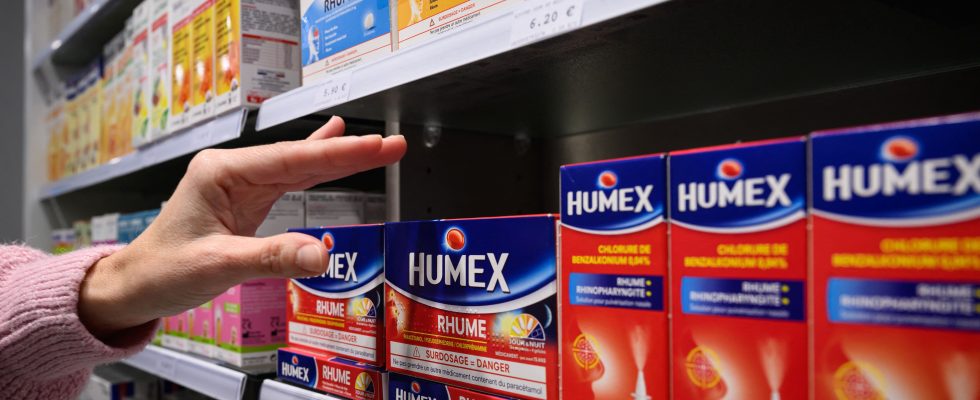Contraindicated, but self-service? For around twenty years, health alerts have been piling up around pseudoephedrine, a decongestant used against colds in drugs such as Humex, Dolirhume or Actifed and which can in rare cases cause strokes or heart attack. This Monday, the National Medicines Safety Agency (ANSM) even “recommended” the molecule, after detecting two new very infrequent but extremely serious neurological adverse effects. Without, however, prohibiting its open access sale.
Why such a decision, when reports in favor of restricting access to these products have been piling up since 2001? In its press release published this Monday, the agency suggests that this is not its fault: “These drugs being available in many other European countries, the ANSM has requested their re-evaluation at the European level on the basis of these new data”. However, the ANSM has the right to suspend the marketing of medicines: it notably did so in 2021, against the AstraZeneca vaccine.
Asked about this choice, while millions of French people consume this molecule and are thus exposed to its toxicity, the ANSM explains that it preferred to increase its information efforts, in collaboration and with the support of health professionals, pharmacists and doctors. . The agency hopes to bring about a lasting change in behavior. A way of ensuring that consumption will drop, even if Europe, seized of the question, ultimately decides in favor of maintaining pseudoephedrine on the market.
The orientations of the French and European authorities may in fact sometimes differ, due to the different approaches that coexist within the European Union in terms of drug safety. Enough to trigger regulatory battles: in 2013, the European Agency (Ema) for example decided in favor of maintaining the sale of the Diane 35 pill, used as an anti-acne, despite the opinion of France, forcing the French authorities to put this product back on the shelves, under certain conditions.
Several prevention plans
Such an imbroglio, if it occurred regarding anti-colds, could harm prevention regarding pseudoephedrine, which still constitutes a necessary part of the winter for many French people. The ANSM has strengthened communication about the risks involved several times: first in 2013, after the National Pharmacovigilance Commission recommended prescription, a recommendation ignored by the agency. And then in 2019, with plans for pharmacists. The latter must ensure that customers requesting these tablets do not have contraindications, such as a history of heart disease.
Advertising for these drugs was also banned in 2017. As a result, the consumption of pseudoephedrine fell between 2010 and 2021, going from 16 million boxes per year to less than 3 million. “With just under 6,000 boxes of pseudoephedrine dispensed per million inhabitants in 2022, France is in 16th place in Europe, far from the average within the European Union located at 14,721 boxes per million inhabitants “, recalls Nères, the federation of manufacturers of over-the-counter medicines, in a press release published this Monday, in favor of the status quo.
The fact remains that these actions, according to the French gendarme himself, are not fully bearing fruit. “The seriousness of these accidents and the persistence of the cases (Editor’s note: cerebral encephalopathy and vasoconstriction) – despite the actions already put in place -, associated with the non-essential nature of vasoconstrictors, lead the ANSM to advise against their use”, recalls the Agency, in its press release published this Monday. Between 2012 and 2018, around 307 serious incidents were reported following the ingestion of decongestants. A tiny figure considering the popularity of these medications, but a risk that it is not reasonable to take, when the cold is mild, specialists explain.
Many French laboratories
“In the case of pseudoephedrine, the agency probably did not judge the health risk high enough to pronounce a suspension, which is only done in rare cases. And it does not want to suggest that it would like to replace to the European authority. Its decision also allows it to avoid bearing sole responsibility for a temporary withdrawal from the market”, deciphers Maître Charlotte Damiano, lawyer specializing in pharmaceutical law, from the Hogan Lovells firm. The lawyer works on marketing issues with pharmaceutical laboratories.
The conditions of sale of pseudoephedrine are now suspended following the opinion of the European Medicines Agency, which is expected to rule in November. But for the moment, nothing indicates that access to the molecule will be restricted: “The pharmaceutical industry is pushing to keep these products over the counter. A prescription would kill these products because they would only be prescribed in certain very rare circumstances”, estimates Jean-Paul Giroud, pharmacologist and former collaborator of the French Medicines Agency.
Among the laboratories that market these cold pills are, in addition to foreign giants like Pfizer or Johnson & Johnson, the French Sanofi or Urgo. Companies that provide a lot of jobs and tax revenue, underlines Jean-Paul Giroud. The manufacturer Upsa, the last French on the list, took the lead, removing the molecule from its “Fervex”, its flagship range, in 2017. Proof that it is possible to do without it.
.
